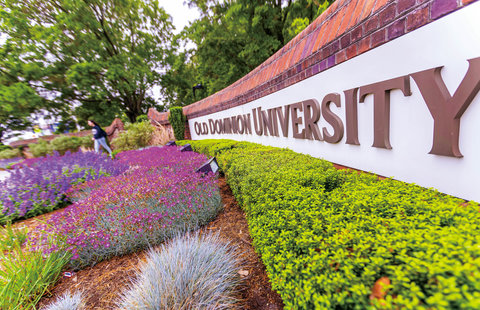The electrical engineering program provides a solid foundation in networks, linear systems, electronics, electromagnetics, digital systems, and physical electronics. Emphasis is placed on understanding principles through theoretical investigation and experimental verification. Learn device fabrication processes (photolithography, oxidation, diffusion, metallization) and fabricate your own circuits in the clean room.
Program Highlights
-
Four tracks to choose from: Systems Science Track, Physical Electronics Track, Digital Design Track, & Electrical Power Track
-
ECE faculty support University centers such as the Applied Research Center, the Frank Reidy Center of Bioelectrics, and the Virginia Modeling, Analysis, and Simulation Center
-
Additional research facilities in the Hampton Roads area with ECE faculty collaboration include the National Institute of Aerospace, NASA Langley Research Center and Jefferson Lab
-
The ECE department has research laboratories focusing on Applied Plasma Technology; Cybersecurity, Communications and Networking Innovation; Microelectronics and Thin Film Devices; Medical Imaging, Diagnosis, and Analysis; Power Research; Systems Analysis of Metabolic Physiology; Systems Research; Virginia Institute for Photovoltaics; and Vision Lab
Careers
Check out these ideas from ODU's Center for Career & Leadership Development and the Occupational Information Network (O*NET). A median salary is a midpoint of what people typically earn—half of those surveyed earned above the median salary, and half earned below.
Software Developers, Applications
Develop, create, and modify general computer applications software or specialized utility programs. Analyze user needs and develop software solutions. Design software or customize software for client use with the aim of optimizing operational efficiency. May analyze and design databases within an application area, working individually or coordinating database development as part of a team. May supervise computer programmers.
Electrical Engineering Technologists
Assist electrical engineers in such activities as process control, electrical power distribution, or instrumentation design. May prepare layouts of electrical transmission or distribution systems, supervise the flow of work, estimate project costs, or participate in research studies.
Computer Systems Analysts
Analyze science, engineering, business, and other data processing problems to implement and improve computer systems. Analyze user requirements, procedures, and problems to automate or improve existing systems and review computer system capabilities, workflow, and scheduling limitations. May analyze or recommend commercially available software.
Web Developers
Design, create, and modify Web sites. Analyze user needs to implement Web site content, graphics, performance, and capacity. May integrate Web sites with other computer applications. May convert written, graphic, audio, and video components to compatible Web formats by using software designed to facilitate the creation of Web and multimedia content.
Alumni Careers
Requirements
-
To enter the program, students must have completed calculus and one college-level computer-programming course (CS 150/ENGN 150 or equivalent).
-
An undergraduate minor in electrical engineering may be obtained by successful completion of 12 or more credit hours of approved electrical or computer engineering coursework at the 200-, 300-, and 400- level.
-
The chief departmental advisor for the Electrical and Computer Engineering Department must approve the precise course of study in the minor.
Transfer
At ODU, we understand that as a transfer student you have unique needs that require a wide array of campus resources. The Center for Advising Administration and Academic Partnerships aims to create a transfer inclusive culture that supports the successful...
Featured Courses
An introduction to the analysis and theory of linear electrical circuits. Topics include: passive component definitions and connection rules; independent and dependent sources, concepts of power & energy; Kirchhoff?s laws; development of network reduction techniques; formulation of mesh-current and node-voltage equations; network theorems including Thevenin, Norton, Maximum power transfer, and superposition Theorem, Operational Amplifiers, Energy Storage Elements, and initial conditions. Time Domain Analysis of First Order and Second Order Circuits, Introduction to Phasors. Basics of matrices and linear algebra with Gaussian elimination; matrix applications to linear circuit analyses; MATLAB and Circuit Simulation software (Multisim) with analyses and applications to passive circuits. (offered fall, spring, summer) Prerequisites: ECE 111 or equivalent and a grade of C or better in MATH 212. Pre- or corequisite: PHYS 232N or PHYS 262N.
Time domain analysis; Sinusoidal steady state analysis; Phasor representation of AC Circuits, Maximum power transfer and Thevenin-Norton theorems for AC circuits; Frequency response of circuits (with R, L, and C components), Laplace Transforms and transfer functions of linear circuits; extension to frequency domain circuit analysis including Bode plots. Active and passive filter design and analysis. (offered fall, spring, summer) Prerequisites: PHYS 232N or PHYS 262N; MATH 280 or MATH 307 and a grade of C or better in ECE 201.
Objective of course is to provide students in electrical and computer engineering with a 'hands-on' introduction to selected topics in electrical engineering. Students will use basic circuit analysis skills and programming skills to design, build, and test electrical networks interfacing to an Arduino Uno micro-controller. Labs will also provide an introduction to basic measurement techniques and electrical laboratory equipment (power supplies, oscilloscopes, voltmeters, etc). Prerequisites: A grade of C or better in both CS 150 or ENGN 150 and ECE 201. Pre- or corequisite: ENGL 211C or ENGL 221C or ENGL 231C and ECE 202.
Cost
Estimated rates for the 2024-25 academic year. Rates are subject to change. Other fees are assessed for special services and certain academic programs. Anyone that is not a current Virginia resident will be charged non-resident rates. That includes international students.
Ways to Save
Here are a few ways for you to save on the cost of attending ODU. For more information visit University Student Financial Aid.
Scholarships
The Department of Electrical and Computer Engineering maintains updated scholarship information on the Undergraduate Resources webpage.
Contact








